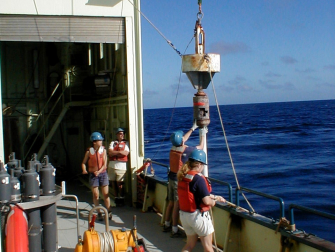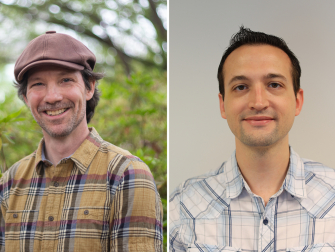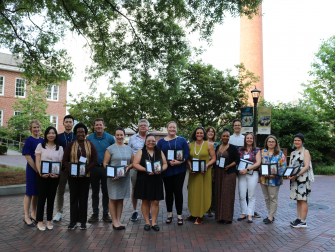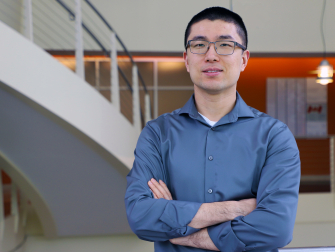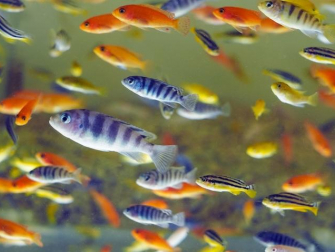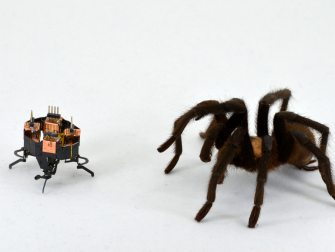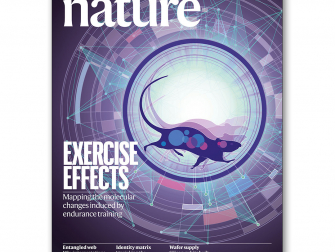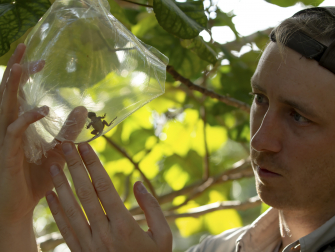To request a media interview, please reach out to experts using the faculty directories for each of our six schools, or contact Jess Hunt-Ralston, College of Sciences communications director. A list of faculty experts is also available to journalists upon request.
News Archive
In a first-of-its kind study, Georgia Tech researchers have investigated how the prehistoric weakening of a major ocean current led to a decline in ocean nutrients and negative impacts on North Atlantic ocean life. The results support predictions about how our oceans might react to a changing climate — and what that means for ocean life.
Mechanical engineering researchers Gregory Sawicki and Aaron Young recently received $2.6 million from NIH to pursue a project focused on using optimization and artificial intelligence to personalize exoskeleton assistance for individuals with symptoms resulting from stroke.
Members of the College of Sciences community gathered at Harrison Square on May 8 to recognize outstanding faculty and staff as part of the 2023-2024 academic year Spring Sciences Celebration.
Georgia Tech researcher Jie He investigated how rainfall will change as Earth’s atmosphere heats up, leading to unexpected discoveries about hydrological sensitivity in tropical basins.
From her home more than 800 miles away, Georgia Tech online master's student Jasmine Tata is monitoring fish in aquariums at Georgia Tech. The student-led research program is part of the School of Biological Sciences' McGrath Lab. Its researchers use machine learning, computer vision, and other technologies to better understand the evolution of animal behaviors.
Georgia Tech Researcher Simon Sponberg collaborates to ask why robotic advancements have yet to outpace animals — and look at what we can learn from biology to engineer new robotic designs.
Georgia Tech physicists are investigating quantum sensing and leveraging cutting-edge techniques — embedding color centers in a 2D layered material called hexagonal boron nitride (hBN). The researchers’ results have created a new resource for developing next-generation, ultra-sensitive quantum electronic devices.
The new Ph.D. in Neuroscience and Neurotechnology is expected to enroll its first graduate students in Fall 2025. The interdisciplinary degree is a joint effort with the Colleges of Sciences, Computing, and Engineering. Sciences will also offer a new Minor in Neuroscience, beginning Fall 2024.
Exercise is good for you. To understand why, MoTrPAC scientists are creating a whole-body map of molecular responses to endurance training — finding striking “all tissue effects” in a new set of studies, featured on this month’s cover of the journal Nature.
Georgia Tech recently hosted a ribbon-cutting ceremony to mark the opening of Science Square's first phase. In collaboration with its partner, Trammell Crow Company (TCC), the Institute celebrated the opening of this cutting-edge space dedicated to scientific discovery.
This semester, 33 faculty members from across the Institute were awarded tenure. Tenure recognizes a faculty member’s contributions to Georgia Tech through research, teaching, and community.
Stroud, an Elizabeth Smithgall Watts Early Career Assistant Professor in the School of Biological Sciences, joins nine newly appointed Fellows and ten Early Career Fellows, elected for "advancing the science of ecology and showing promise for continuing contributions" in the field.
- 1 of 107
- next ›

